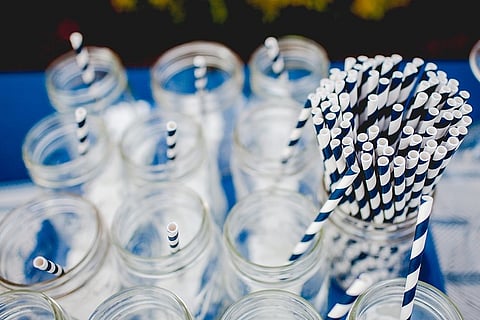

Did you know that years ago, plastic straws were introduced to replace paper straws? In 1888, American inventor Marvin Chester Stone created and patented the ‘artificial straw’ using paper – as a replacement for natural rye grass straws. He wound a piece of paper around a pencil and glued the sides. Although paper straws soon gained popularity, the downside was that they would eventually disintegrate in the drink and leave a strange taste. And thus, in the 60s, plastic straws were introduced as an efficient alternative for sipping drinks.
Today, a host of countries, including some parts of India, have switched back to paper straws with all good intentions, as an eco-friendly solution to the growing plastic pollution. Paper straws are compostable and biodegradable (they take two to six weeks to decompose), but still present the same set of problems they did years ago – sogginess and the unpalatable taste of wet paper in the mouth. After a few minutes in the drink, the straw deforms into a doughy piece of paper.
This raises the question: if we use paper straws, are we unconsciously ingesting paper when sipping cocktails, iced teas and milkshakes?
Is using paper straws harmful to our body?
Paper straws, no brainer, are made of paper, which is made from wood. The wood pulp is bleached to turn the colour from brown to the white of the paper. Besides, a bleached surface is required to dye the straw different colours.
Does this mean we are sipping chemical-coated liquid and eating tiny pieces of paper when drinking through paper straws soaked in drinks for some time?
Dr Shalini Joshi, Consultant, Internal Medicine at Fortis Hospital in Bengaluru, says that even if the straws are made from fresh paper or recycled paper, the cellulose from the paper is going inside the body. “Vegetables have cellulose, which is, as such, not harmful; however, the ones in straws are chemically treated,” she explains.
She adds that bits and pieces of the paper straw that are inadvertently ingested are not harmful and will be eliminated by the body unless the outside and inside of the straws are quoted with wax.
Some manufacturing companies claim that their paper straws are made from wax and glue approved by Food and Drug Administration (FDA) or from Kraft paper, which can be recycled or reused.
However, Deepa Agarwal, a Hyderabad-based nutritionist, says if they are reused, then the ingredients present in the straws to protect it from disintegrating in the drinks, tend to wear away. This will allow more interaction in the drink if the same straw is used multiple times.
She also points out that that there is no harm to the human body if the wax or glue used in the paper straws is FDA-approved and of food-grade quality. “However, the ingredients and the proportions should be within safe limits, because edible waxes are not broken down by the body for absorption, although they are eventually eliminated,” she adds.
How about drinking without a straw?
Yes, there are alternatives for paper straws – metal straws, bamboo straws, and even straws made with food, like the cookie straws at Starbucks. Sippy cups are also a viable option.
But it is pertinent to ask a more basic question: do we actually need straws? Can’t we drink directly from the glass?
Apart from the strange taste in your mouth, here are some more reasons not to use straws.
Deepa Agarwal points out that irrespective of the kind of straw used, one is swallowing in air which, in turn, causes the stomach to bloat and could lead to stomach cramps.
Secondly, paper straws cannot be recycled. At a time when the entire world is grappling with a garbage problem, eliminating paper straws will help minimise food waste.
“For that matter, environmentalists do not encourage any use-and-throw items, even if they are eco-friendly products like areca nut plates. We are only generating more trash,” points out P Natarajan of Namma Ooru Foundation, which offers sustainable solutions for waste management.
“There was a time when we used to sip tender coconut water without straws and knew how to drink it without spilling. It’s time to go back to those ways,” he adds.
Of course, persons with disabilities, and some children and senior citizens might need straws. “Some people with severe disabilities or medical conditions like Parkinson’s disease have restricted hand movement or lack firmness in grip. It is important to have some stock of straws for them. It is not only about letting them drink on their own but giving him/her respect,” says Shanti Raghavan, founder and chief enabler of Enable India, a non-profit organisation working towards the welfare and dignity of persons with disability.
Hence, restaurants, cafes and pubs can give eco-friendly straws on request to those who absolutely need it.